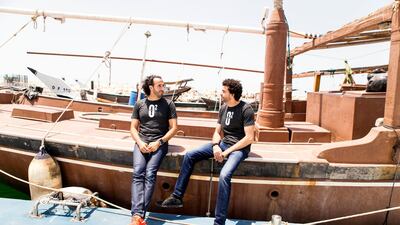In less than a week, a boat will be living space for two athletes who have undergone gruelling physical training to be the first team from the Arab region to row across the Atlantic.
When Dubai residents Omar Nour and Omar Samra of Team O2 set out from the Canary Islands on December 12 to journey the 5,000 kilometre Atlantic Challenge to Nelson’s Dockyard in Antigua, they will join a small community of athletes to achieve ‘the world’s toughest row.’
Their final intense preparation was a 60-hour row last month off Gran Canaria, near the start of the race. It gave them a taste of the sleep deprivation they will endure as each of them row in two-hour intervals while the other sleeps.
“The main thing was we were able to follow the rowing pattern of two hours on and off throughout the day and night. In previous trips we were not able to because the navigation equipment was not working so when one of us was rowing, the other person could not rest but had to steer,” said Mr Samra, a mountaineer who has climbed Mount Everest.
Since their first overnight row seven months ago, they have been pushed to the limit as they faced storms, powerful currents and broken down navigation systems during a100-hour row in the North Sea off the coast of Essex in the UK.
This experience is necessary for the crossing.
In previous races, rowers have hunkered down in hurricanes, battled 50-foot waves and described close encounters with whales and sharks.
The world record for pairs is 40 days, four hours and three minutes. But of roughly two dozen teams that set off annually, several do not make it to the end and are worn out by the waves, weather, illness or boat trouble.
“There is real risk and real life threatening danger so you have to prepare as best you can. The main thing is to respect the ocean. You have to come to terms quickly that you are pretty powerless because it is the biggest force, bigger than the sharks, bigger than anything. We have learnt that the first 36 hours will be miserable as the body adjusts to sea sickness,” said Mr Nour, a professional triathlete.
“We have been meticulous in preparing but it would be arrogant to think we are 100 per cent ready,” he said.
Both men are no strangers to adventure.
Mr Samra was first Egyptian to climb Everest, and the 7 Summits when he scaled the highest mountain in each continent and has also skied to the North and South Pole.
Egypt’s first professional triathlete, Mr Nour once weighed in at 105 kg and is now an advocate for an active, healthy life.
Still, the ocean is a fresh challenge.
“I’m accustomed to climbing mountains. The duration, lack of oxygen made Everest technically challenging. But this is overwhelming because the ocean is a complete unknown.,” he said.
“Sleep deprivation breaks people. You can manage for a few days and then it takes its toll. Another thing I’m concerned about is big storms at night,” said Mr Samra who runs an adventure travel company and a children’s charity.
Read more: Pizza, vegetables, solar panels in boat supplies
UAE-based athletes aim to become first Arabs to row 5,000km across Atlantic Ocean
For safety, the Omars must wear a harness on deck. The rules specify that contestants must fix problems themselves. There are support boats to hand but if a bottle of water or a single piece of equipment is handed across, the team is disqualified from the race but can still complete the challenge.
Through the rigour of preparation, they have seen some breath-taking sights.
“This adventure takes all experiences of life and packs it into a small time line. Near the Canary Islands, at 2 or 3 in the morning, we could see the Milky Way and incredible lights as shooting stars went across the sky. It was unbelievable when we rowed through fire luminescent plankton. Every time we put the oars in the water, it lit up the water in green,” said Mr Nour, who runs a sports goods distribution company.
As race day approaches, they will maintain strength with weight training and also read up on safety.
The teammates know it will not be all excitement and adrenalin.
“It sounds majestic. In your head you think of big waves and storms. But this will not be from beginning to end. It will be a lot of hard work; most days will be tedious. Having a shark or whale coming to say hello, as long as we are not in the water with them, will be a welcome break,” said Mr Nour.


